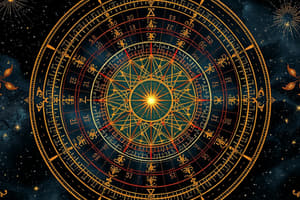Podcast
Questions and Answers
What 4 properties does the HR Diagram use to classify stars?
What 4 properties does the HR Diagram use to classify stars?
- Temperature (correct)
- Absolute Magnitude (correct)
- Luminosity (correct)
- Spectral Class (Color) (correct)
How many TYPES of stars are shown on the HR Diagram?
How many TYPES of stars are shown on the HR Diagram?
4
As a star changes color from red to blue, what happens to its surface temperature?
As a star changes color from red to blue, what happens to its surface temperature?
It gets hotter
Which type of star is dimmer than the sun?
Which type of star is dimmer than the sun?
What is the relationship between luminosity and temperature for stars on the Main Sequence?
What is the relationship between luminosity and temperature for stars on the Main Sequence?
What determines the color of a star?
What determines the color of a star?
Which of the following describes our Sun? (Select the correct answer)
Which of the following describes our Sun? (Select the correct answer)
Explain what a Cepheid Variable Star is:
Explain what a Cepheid Variable Star is:
What type of star has both a low luminosity and low temperature?
What type of star has both a low luminosity and low temperature?
What color are stars with very low temperatures?
What color are stars with very low temperatures?
What color are stars with very high temperatures?
What color are stars with very high temperatures?
How does Fusion form?
How does Fusion form?
How does a Red Giant form?
How does a Red Giant form?
How does a Red Supergiant form?
How does a Red Supergiant form?
What is the relationship between temperature/color and brightness in the HR Diagram?
What is the relationship between temperature/color and brightness in the HR Diagram?
What is the relationship between temperature/color and expected lifetime? Which stars will die first and why?
What is the relationship between temperature/color and expected lifetime? Which stars will die first and why?
Which color of stars die out faster?
Which color of stars die out faster?
Why do stars with a high temperature die out faster?
Why do stars with a high temperature die out faster?
Which type of stars have a longer lifetime: high temperature stars or low temperature stars?
Which type of stars have a longer lifetime: high temperature stars or low temperature stars?
Which type of stars have a shorter lifetime: high temperature stars or low temperature stars?
Which type of stars have a shorter lifetime: high temperature stars or low temperature stars?
Explain why we know that there are red giants and supergiants on the HR Diagram.
Explain why we know that there are red giants and supergiants on the HR Diagram.
What are the 4 TYPES/GROUPS of stars?
What are the 4 TYPES/GROUPS of stars?
Describe a cool star:
Describe a cool star:
What is luminosity?
What is luminosity?
What is absolute magnitude?
What is absolute magnitude?
What is apparent magnitude?
What is apparent magnitude?
What 2 things affect the absolute magnitude and/or apparent magnitude of a star?
What 2 things affect the absolute magnitude and/or apparent magnitude of a star?
Describe a large star:
Describe a large star:
Describe a small star:
Describe a small star:
Red Stars =
Red Stars =
Blue Stars =
Blue Stars =
What is spectral class?
What is spectral class?
What affects the luminosity of a star?
What affects the luminosity of a star?
What 3 things determine how bright a star will appear from Earth?
What 3 things determine how bright a star will appear from Earth?
What is the color order on the HR Diagram from cold to hot?
What is the color order on the HR Diagram from cold to hot?
Flashcards are hidden until you start studying
Study Notes
HR Diagram Overview
- Classifies stars using four properties: Luminosity, Spectral Class (Color), Temperature, and Absolute Magnitude.
- Total of four types of stars represented on the HR Diagram: Supergiants, Giants, Dwarfs, Main Sequence.
Star Color and Temperature
- Stars change color from red (cooler) to blue (hotter) as their surface temperature increases.
- Low temperature stars appear red, while high temperature stars appear blue.
Star Classification
- The Sun is classified as a yellow star, considered average and serves as the luminosity reference point.
- Dwarf stars are dimmer than the Sun.
- Cepheid Variable Stars experience changes in size and brightness, with an inverse relationship between size and temperature.
Luminosity and Temperature Relationship
- Brightness and temperature positively correlate: as a star's temperature increases, its luminosity also increases.
- High temperature stars (blue) have shorter lifespans due to faster fuel consumption, while low temperature stars (red) live longer.
Lifecycle of Stars
- Fusion occurs when hydrogen combines to form helium, releasing energy.
- Red Giants form from the fusion of helium into carbon, whereas Red Supergiants involve the fusion of helium and hydrogen into carbon and heavy elements.
Magnitude Definitions
- Absolute Magnitude refers to brightness from a specific distance; Apparent Magnitude refers to how bright a star appears from Earth.
- Both magnitudes are influenced by a star's size and temperature.
Star Characteristics
- Large stars burn fuel faster and die sooner, while small stars burn fuel slower and live longer.
- A cool star is described as dim and long-lived due to its slower fuel consumption.
Spectral Classification
- Spectral Class, denoted by the color, is categorized with the Sun labeled as G2 within the classification system.
HR Diagram Color Order
- The color order from coldest to hottest stars is: Red, Orange, Yellow, White, Teal/Green, Blue.
Location on HR Diagram
- Red Giants and Supergiants do not align with the Main Sequence trend line and are significantly larger and brighter than typical stars.
Studying That Suits You
Use AI to generate personalized quizzes and flashcards to suit your learning preferences.




